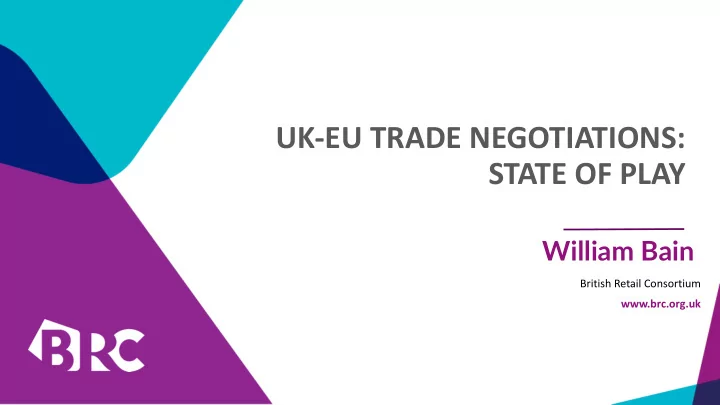

UK-EU TRADE NEGOTIATIONS: STATE OF PLAY William Bain British Retail Consortium www.brc.org.uk
EU-UK TRADE TIMELINE – THE NEXT FEW MONTHS • Jun 1 – Final round of negotiations before High Level summit. • June TBC – EU/UK High Level summit (stocktake on progress). • Jun 17/18 – European Council summit. • July 1 – Date by which any extension of transition must be agreed within the Joint Committee.
EU-UK TRADE – THE NEXT FEW MONTHS • Could still be an agreement by October but will require movement on fisheries from EU, level playing field from both sides if the talks don't collapse next month. • Key importance is avoiding a deal with tariffs or no agreement at all. Then retail and consumers would be highly exposed to extra costs even down the supply chain, especially on agri-food. • Also need agreements on SPS, safety and security, rules of origin, organic food, conformity assessment of electrical, industrial goods and toys. • Unlikely to be an extension agreed in June. Transition period to expire end of December. • Negotiations would need to be concluded by end of October to give any ratification period or preparation period at all. • In reality members would require many more months than that to prepare for new customs, VAT, SPS, product checks, rules of origin, safety and security, CTC systems. • Could still be an agreement by October but will require movement on fisheries, governance of the agreement, and the level playing field from both sides if the talks don't collapse next month.
EU-UK TRADE – THE SCENARIOS • The following scenarios appear plausible: • No extension agreed in June – talks are collapsed by either or agreement of both sides. No trade agreement in place for 1 January. Both sides trade on their tariff schedules, WTO and other international agreements where possible, or no agreements where not. • No extension agreed in June – talks continue but reach crisis point by October with end of transition period looming. • No extension agreed in June – talks continue, and legal fix is found in October to extend negotiating period. • Extension agreed in June – transition period extended until end December 2021. The least plausible option now.
EU-UK TRADE – POINTS OF DISAGREEMENT • Level playing field • Human rights protection • Governance of the agreement • Fisheries • Others: conformity assessment, veterinary agreement, organic food, rules of origin. UK not seeking safety and security agreement with the EU either • Legal texts show UK is seeking most of its asks on collection of past precedents from EU trade deals but some are novel. Zero-tariff deal would be novel.
EU-UK TRADE – BUSINESS READINESS • What we know is changing: • VAT (imports/exports) • Customs (customs declarations and entry/exit summary declarations required) • What we don’t know: • Paperwork, databases and processes for the above • HMG attitude to GB border and other controls from inbound EU goods • Outcomes awaited on rules of origin, SPS, conformity assessment and product checks, Common Transit Convention processes, organics, tariffs, chemicals, medicines, pharma • Business needs more time to prepare (6-7 months?) . How - if no extended transition period? • HMG guidance. Some exists for EU companies from the European Commission
EU-UK TRADE – UK GLOBAL TARIFFS • Applies to non-preferential UK trade (ie. excluding trade deal partners and developing world through the successor to the GSP, GSP+, EBA schemes) • Favours producers and manufacturers – inputs and intermediate products see largest reductions compared with EU MFN rates • Agri-food and industrial products see only modest reductions in tariffs compared with EU MFN • BUT if retailers had to trade on these applied tariffs on a no deal outcome, 85% of UK food imports from the EU would be hit with tariffs above 5% or non-ad valorem tariffs. This would be unsustainable. On this scenario we would require an adjustment on those product lines from HMG. What would these be?
Recommend
More recommend